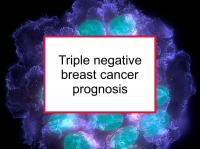The risk of a second estrogen receptor negative (ER-) breast tumor (in the same or the opposite breast) is relatively high after a first ER- breast cancer diagnosis, particularly among women with a strong family history of breast cancer. Factors such as tumor size, lymph node status, and proliferation index (Ki-67) all influence prognosis.
BRCA1 mutation carriers with triple negative breast cancer appear to have similar survival rates to noncarriers, although not all studies are in agreement. Multifocal triple negative breast cancer has worse prognosis than unifocal (single tumor) triple negative disease. Women with small (up to 1 cm), lymph node negative triple negative tumors generally have excellent five-year disease-free survial rates as long as the tumors are aggressively treated.
Positive lymph nodes and micrometastases
The presence of any lymph node metastases or micrometastases is a negative prognostic indicator for triple negative disease. Tumor size appears to be a more important indicator than the number of positive lymph nodes among triple negative patients that are lymph node positive (i.e., once there is evidence of lymph node metastasis). However, one study found that a substantial minority of triple negative patients who developed recurrences were lymph node negative after mastectomy.
High proliferation is associated with poor prognosis
Tumor proliferation, as measured by Ki-67 (normally found on breast pathology reports), is associated with triple negative recurrence. One study reported that the risk of breast-cancer specific death among women with triple negative disease rose steadily in line with increases in Ki-67 up to approximately 35%. The risk of death remained flat thereafter, indicating that Ki-67 levels over 35% did not confer additional risk of relapse. Ki-67 exceeds 35% in the majority of triple negative tumors.
Hormone receptor status can change during disease progression
Hormone receptor status can change during disease progression (this is known as discordance). Breast cancer that starts as an ER+ and/or PR+ primary tumor and converts to triple negative status when the cancer recurs has a worse prognosis than disease that is consistently ER+ and/or PR+. However, triple negative disease that relapses as non-triple negative cancer also has a worse prognosis. One study found that average survival after disease relapse was 30 months for persistent triple negative breast cancer compared to 85 months for non-triple negative breast cancer. Survival for discordant cases was 59.9 months for non-triple negative breast cancer status followed by triple negative breast cancer, 57.2 months for triple negative followed by non-triple negative with HER2 overexpression, and 21.9 months for triple negative followed by non-triple negative without HER2 overexpression.
Endocrine treatment is not effective for most triple negative cases
Some triple negative tumors have a small degree of ER or PR positivity, raising the question as to whether such tumors are responsive to endocrine treatment (tamoxifen or an aromatase inhibitor). A study that examined this question found that endocrine treatment of tumors with low ER/PR levels (1%-5%) did not have any significant impact on survival outcomes. There was a tendency for a survival advantage in women with 6% to 10% ER/PR levels, but the benefit of endocrine therapy in these patients was unclear, leaving the question unsettled for this group.
Histological type influences triple negative prognosis
Ductal breast cancer is the most common histological type of triple negative breast cancer, representing 85% to 90% of cases. More rare are lobular, mucinous, adenoid cystic, and mixed tumors (which include tumor cells of more than one histological type). Medullary and metaplastic carcinoma are rare subtypes of ductal breast cancer. Adenoid cystic and medullary triple negative tumors have a more favorable prognosis than ductal tumors. On the other hand, metaplastic tumors have worse prognosis. One 2012 study reported that the five-year breast cancer relapse-free survival rate was 77% for ductal, compared to 56% for metaplastic, and 100% for both adenoid cystic and medullary triple negative disease.
Triple negative breast cancer in men
Men with triple negative breast cancer are thought to have worse prognosis compared to women with triple negative disease. One study found that men with hormone receptor negative tumors tended to have unfavorable survival compared to women with ER-/PR- disease. Missing ER as well as PR was associated with a poor prognosis in both sexes, however PR- in men appeared to be of greater prognostic importance than PR- in women.
Below under Selected breast cancer studies are links to recent studies concerning tumor characteristics that influence the prognosis of triple negative breast cancer patients.
Additional triple negative breast cancer articles
Below are links to some other articles concerning triple negative breast cancer.
